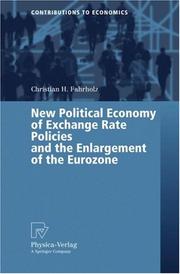| Listing 1 - 3 of 3 |
Sort by
|

ISSN: 14311933 ISBN: 1280701315 9786610701315 3790817627 3790817619 9783790817614 Year: 2007 Publisher: Heidelberg Physica-Verlag
Abstract | Keywords | Export | Availability | Bookmark
 Loading...
Loading...Choose an application
- Reference Manager
- EndNote
- RefWorks (Direct export to RefWorks)
This work examines the political economy of exchange-rate policies in the context of the eastward enlargement of the eurozone. The analysis shows that prospective members of the EMU are likely to pass on some of the incurred Maastricht costs of convergence to the current EMU-members. The transmission mechanism is an altered exchange-rate policy that is carried out utilizing a "threaten-thy-neighbour"-strategy. The nature of the arising conflict between current and prospective EMU-members originates from both parties' admitted inclination to complete the enlargement process, complicated by their disinclination to bear the costs. The ensuing moral-hazard behaviour of the CEECs proves to be one of brinkmanship. The subsequent bargaining game results in a robust outcome most likely in terms of providing extra European funding. This may then ensure a stabilization of the CEECs' convergence toward the EMU, and a successful completion of eastward enlargement of the eurozone.
Foreign exchange rates
---
Monetary policy
---
Economic stabilization
---
Government policy
---
Fahrholz, Christian H.
---
European Union countries
---
Economic integration.
---
Adjustment, Economic
---
Business stabilization
---
Economic adjustment
---
Stabilization, Economic
---
Economic policy
---
Monetary management
---
Currency boards
---
Money supply
---
Exchange rates
---
Fixed exchange rates
---
Flexible exchange rates
---
Floating exchange rates
---
Fluctuating exchange rates
---
Foreign exchange
---
Rates of exchange
---
Rates
---
Economics.
---
Macroeconomics.
---
European Economic Community lite.
---
Economic theory.
---
Economic policy.
---
Economics, general.
---
Macroeconomics/Monetary Economics//Financial Economics.
---
European Integration.
---
Economic Theory/Quantitative Economics/Mathematical Methods.
---
Economic Policy.
---
Economic nationalism
---
Economic planning
---
National planning
---
State planning
---
Economics
---
Planning
---
National security
---
Social policy
---
Economic theory
---
Political economy
---
Social sciences
---
Economic man
---
334.151.27
---
334.152.0
---
EEC / European Union - EU -Europese Unie - Union Européenne - UE
---
338.22
---
339.743 <4>
---
339.92
Multi
ISBN: 9783790817621 Year: 2007 Publisher: Heidelberg Physica-Verlag Heidelberg
Abstract | Keywords | Export | Availability | Bookmark
 Loading...
Loading...Choose an application
- Reference Manager
- EndNote
- RefWorks (Direct export to RefWorks)
Macroeconomics --- Economic policy and planning (general) --- Economics --- Operational research. Game theory --- economie --- economische politiek --- macro-economie --- speltheorie --- Europese eenmaking --- Europe
Book
ISBN: 9783790817621 Year: 2007 Publisher: Heidelberg Physica-Verlag HD
Abstract | Keywords | Export | Availability | Bookmark
 Loading...
Loading...Choose an application
- Reference Manager
- EndNote
- RefWorks (Direct export to RefWorks)
This work examines the political economy of exchange-rate policies in the context of the eastward enlargement of the eurozone. The analysis shows that prospective members of the EMU are likely to pass on some of the incurred Maastricht costs of convergence to the current EMU-members. The transmission mechanism is an altered exchange-rate policy that is carried out utilizing a "threaten-thy-neighbour"-strategy. The nature of the arising conflict between current and prospective EMU-members originates from both parties' admitted inclination to complete the enlargement process, complicated by their disinclination to bear the costs. The ensuing moral-hazard behaviour of the CEECs proves to be one of brinkmanship. The subsequent bargaining game results in a robust outcome most likely in terms of providing extra European funding. This may then ensure a stabilization of the CEECs' convergence toward the EMU, and a successful completion of eastward enlargement of the eurozone.
Macroeconomics --- Economic policy and planning (general) --- Economics --- Operational research. Game theory --- economie --- economische politiek --- macro-economie --- speltheorie --- Europese eenmaking --- Europe
| Listing 1 - 3 of 3 |
Sort by
|

 Search
Search Feedback
Feedback About UniCat
About UniCat  Help
Help News
News